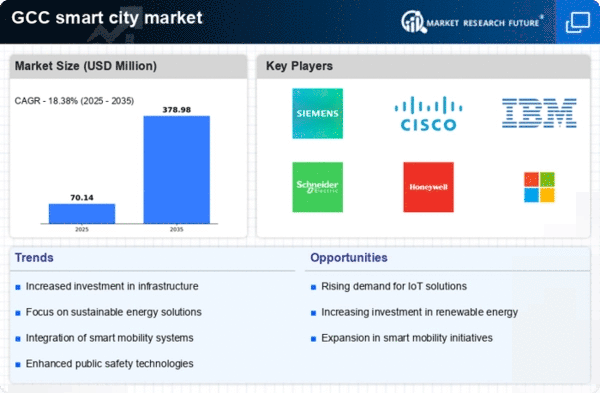Enhanced Quality of Life
The smart city market is increasingly driven by the need to enhance the quality of life for urban residents in the GCC. As cities become more populated, the demand for improved public services, safety, and overall living conditions intensifies. Smart city solutions, such as smart healthcare systems, efficient public transportation, and enhanced public safety measures, are being developed to address these needs. For instance, smart healthcare technologies can provide remote monitoring and telemedicine services, improving access to healthcare for residents. The emphasis on creating livable, safe, and connected urban environments is likely to propel the growth of the smart city market. As cities implement these solutions, they may foster a sense of community and well-being among residents, further driving market demand.
Rising Urbanization Rates
Urbanization in the GCC is escalating, with projections indicating that urban populations could reach 90% by 2030. This rapid urban growth is creating a pressing need for efficient urban planning and management, thereby propelling the smart city market. As cities expand, challenges such as traffic congestion, pollution, and inadequate public services become more pronounced. The smart city market offers innovative solutions to address these issues, including smart traffic management systems and integrated public transport networks. The increasing demand for sustainable urban living is likely to drive investments in smart technologies, which could enhance the overall quality of life for residents. Consequently, the rising urbanization rates in the GCC are expected to be a key driver for the smart city market.
Technological Advancements
Technological advancements are playing a pivotal role in shaping the smart city market in the GCC. The proliferation of advanced technologies such as artificial intelligence (AI), big data analytics, and the Internet of Things (IoT) is enabling cities to operate more efficiently. For instance, AI-driven traffic management systems can optimize traffic flow, potentially reducing congestion by up to 30%. Moreover, the integration of IoT devices allows for real-time monitoring of urban infrastructure, enhancing service delivery and resource management. As these technologies continue to evolve, they are likely to create new opportunities within the smart city market, fostering innovation and improving urban living conditions. The ongoing research and development in this sector may further stimulate growth and adoption of smart city solutions across the region.
Environmental Sustainability Goals
The GCC countries are increasingly prioritizing environmental sustainability, which is becoming a crucial driver for the smart city market. Governments are setting ambitious targets to reduce carbon emissions and promote renewable energy sources. For example, Saudi Arabia aims to generate 58.7 GW of renewable energy by 2030, which aligns with the objectives of smart city initiatives. The integration of smart technologies can facilitate energy management, waste reduction, and water conservation, contributing to these sustainability goals. As cities strive to become more eco-friendly, the demand for smart solutions that support sustainable practices is likely to grow. This focus on environmental sustainability may not only enhance the livability of urban areas but also attract investments in the smart city market.
Government Initiatives and Investments
The smart city market in the GCC is experiencing a surge due to proactive government initiatives and substantial investments aimed at urban modernization. Various GCC nations are allocating significant budgets to enhance infrastructure, with some countries earmarking up to $100 billion for smart city projects over the next decade. These investments are often directed towards developing smart transportation systems, energy-efficient buildings, and advanced waste management solutions. The commitment of governments to foster innovation and improve the quality of life for citizens is likely to drive the growth of the smart city market. Furthermore, public-private partnerships are becoming increasingly common, facilitating the sharing of resources and expertise, which may further accelerate the development of smart city solutions in the region.
















